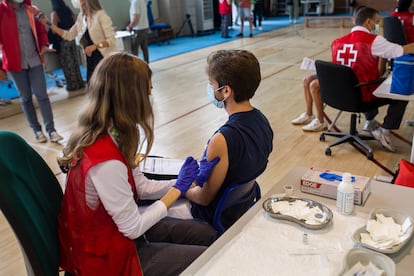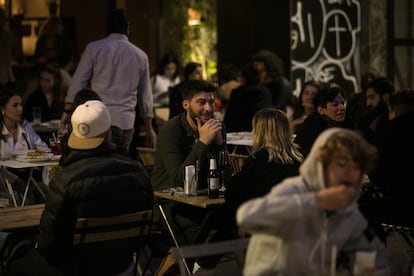In Spain, elderly 25 times more at risk of dying from Covid-19 if unvaccinated
Coronavirus infections continue to rise, with the incidence rate jumping seven points to 132 per 100,000 on Tuesday

The Spanish Health Ministry on Tuesday released data on how the coronavirus pandemic is affecting the vaccinated and unvaccinated population. According to the report, the coronavirus incidence rate is nearly three times higher among the unvaccinated than among those who are completely immunized. In the last two months, the average seven-day incidence rate was 23.1 cases per 100,000 inhabitants among the vaccinated, compared to 64.5 among those who have refused the Covid-19 shots.
These differences become pronounced with age, given that the elderly are more vulnerable to developing a serious case of Covid-19. The report found that people between 60 and 80 years of age were 25 times more at risk of dying from the disease if unvaccinated, compared to those who were fully immunized in the same age group.
“Vaccinate, vaccinate, vaccinate continues to be the best path,” said Spanish Health Minister Carolina Darias at a press conference on Tuesday.
The breakdown of coronavirus data by vaccination status also highlighted the vaccines’ effectiveness in preventing infection and serious cases of Covid-19. Between September 20 and November 14 of this year, the population aged 60 to 80 was eight times more at risk of contracting the virus, and 18 times more likely to be hospitalized if they were unvaccinated.
What’s more, this impact was seen across all age groups in Spain. In the last two months, the weekly incidence rate among the vaccinated in the 12-19 population was 9.6 cases per 100,000, compared to 59.7 cases for the unvaccinated. While in the 30-50 population, transmission among the unvaccinated was double that of the vaccinated.
Vaccinate, vaccinate, vaccinate continues to be the best pathHealth Minister Carolina Darias
The risk of hospitalization was also lower among the immunized. According to the report, in the last two months, the weekly hospitalization rate among the 30-59 age group was 0.1 cases per 100,000 for the vaccinated, and 3.9 cases for the unvaccinated. Among the 60-79 fully immunized population, the rate of hospitalization was two cases per 100,000, compared to 35.6 cases for those who had not been vaccinated. This difference was also seen in the rate of intensive care unit (ICU) admissions and fatalities: among the vaccinated, these data points came in at 0.3 and 0.1 per 100,000 respectively, while among the unvaccinated, the figures were 6.9 and 2.5, respectively.
The data released on Tuesday supports an earlier October study from the Health Ministry, which found that vaccination reduces the risk of hospitalization and death from Covid-19 by more than 90% in most age groups. In Spain, nearly 80% of the population is fully vaccinated against Covid-19, while in the 12-19 age group, vaccination coverage is at 84%.
The news about the effectiveness of vaccines comes as coronavirus cases continue to rise in Spain. On Tuesday, the Health Ministry reported 6,777 new infections, while the incidence rate jumped seven points to 139 cases per 100,000. A total of 34 Covid-19 fatalities were added to the official count, bringing the total since the beginning of the pandemic to 87,866.
But while contagions are rising, the situation in Spain has not reached the level of neighboring European countries, such as Austria, where the incidence rate is close to 2,000 cases per 100,000. What’s more, the pressure on hospitals is under control. While admissions are rising – there are currently 3,000 Covid-19 patients in hospital and 546 in ICUs – the occupancy rate is much lower than was seen in previous waves. Just 2.4% of regular hospital beds and 6% of ICU beds are occupied by Covid-19 patients, compared to 24% and 42% respectively, at the peak of the third wave.
Indeed, due to the low hospital-occupancy rates Spain is considered in a low-risk scenario under the new traffic light system that was approved on Tuesday by the Public Health Commission, which brings together central and regional health chiefs.

The document lifts some of the thresholds to better reflect the fact that nearly 80% of the population in Spain is fully vaccinated, meaning the risk of the pandemic is lower. The threshold for a low-risk scenario has risen from 50 to 100 cases per 100,000 people over 14 days, while some of the previous parameters, such as ICU occupancy rates, remain unchanged.
The system, however, was approved without corresponding guidelines on what restrictions should be introduced in each risk scenario. One proposal, for example, was to limit the opening hours of the hospitality sector in medium-risk areas.
“The traffic light document has been approved. They are only indicators of risk, without measures. We are working on them. That is all I can say,” said Health Minister Darias.
While the traffic light system may not recommend specific restrictions, some regions are already taking action to curb the spike in coronavirus infections. In Catalonia, the Catalan High Court approved on Tuesday the regional government’s request to introduce the European Union’s Digital COVID Certificate in bars, restaurants, gyms and nursing homes. Starting Friday, residents in the region will need to present the document to enter these sites. This certificate can be accessed in Spain via each region’s healthcare system, and certifies whether the bearer has been vaccinated against Covid-19, has recently recovered from an infection, or has been tested for the virus.
Booster shots for 60-69 population
Health Minister Darias announced on Tuesday that the Public Health Commission had approved booster shots for the Covid-19 vaccine to the 60-69 population as well as health workers and nursing home staff. This collective will join the 16 million people who are already eligible for an additional dose – a group that is made up of the immunocompromised, nursing home residents, the over-70s and recipients of the single-shot Janssen vaccine.
“We know that after a certain time has passed, the neutralizing antibodies start to fall. That’s why these booster shots are important to maintaining a high level of immunity,” said Darias. “The key is to keep vaccinating nonstop – those who have not been vaccinated and those who need a booster.”
Tu suscripción se está usando en otro dispositivo
¿Quieres añadir otro usuario a tu suscripción?
Si continúas leyendo en este dispositivo, no se podrá leer en el otro.
FlechaTu suscripción se está usando en otro dispositivo y solo puedes acceder a EL PAÍS desde un dispositivo a la vez.
Si quieres compartir tu cuenta, cambia tu suscripción a la modalidad Premium, así podrás añadir otro usuario. Cada uno accederá con su propia cuenta de email, lo que os permitirá personalizar vuestra experiencia en EL PAÍS.
¿Tienes una suscripción de empresa? Accede aquí para contratar más cuentas.
En el caso de no saber quién está usando tu cuenta, te recomendamos cambiar tu contraseña aquí.
Si decides continuar compartiendo tu cuenta, este mensaje se mostrará en tu dispositivo y en el de la otra persona que está usando tu cuenta de forma indefinida, afectando a tu experiencia de lectura. Puedes consultar aquí los términos y condiciones de la suscripción digital.








































